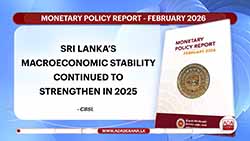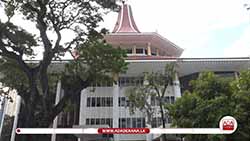Glyphosate banned, but new pesticide far worse - expert
June 14, 2016 01:06 pm
A new pesticide named ‘Glufosinate’ which is reportedly 15 times more powerful than the banned pesticide ‘Glyphosate’ has been registered in Sri Lanka, an expert said.
Dr. Channa Jayasumana of the Department of Pharmacology of Rajarata University claims the new pesticide is already available in stores which can be harmful for people.
According to Dr. Jayasumana, the side effects of Glufosinate may harm the male reproductive system and may lead to many illnesses including kidney diseases.
“Immediate steps should be taken to remove Glufosinate from the local market,” he added. Dr. Jayasumana also held the Registrar of Pesticides Department responsible for his failure to test the quality of pesticides before sending it to the market.
However, Assistant Registrar of the Pesticides Department Sumith Jayakody told Ada Derana, if safety measures were followed, the new portside will not cause unreasonable adverse effects.
“According to the WHO pesticide evaluation scheme, banned pesticide Glyphosate had come under the second category, but Glufosinate comes under the fourth category. Occupational exposure limit of Glufosinate is higher as well,” he said.
Jayakody also stressed Glufosinate was first registered in Sri Lanka back in late 90s, not recently.
The government had earlier banned the use and sale of pesticides containing five certain ingredients including Glyphosate, which has been linked to the dramatic increase in Kidney Disease in the North Central Province earlier.
In a Gazette Notification, the Registrar of Pesticides stated that every license issued in respect of pesticides containing the active ingredients Glyphosate, Propanil, Carbaryl, Cholopyrifos and Carbofuran were modified.
According to a study published in the International Journal of Environmental Research and Public Health, the active ingredient known as Glyphosate becomes highly toxic when mixed with ‘hard’ water or heavy metals like arsenic or cadmium that naturally exists within the soil or added as fertilizer.
Earlier, the Government had also approved the immediate removal of pesticides containing Glyphosate from the local market after an investigation carried out by local medical specialists and scientists revealed that kidney disease was mainly caused by the herbicide, however the proposal was not signed into a law. Starting in the mid-1990s, this Chronic Kidney Disease of unknown aetiology (CKDu) was discovered among the rice paddy farmers in the North Central Province (NCP) of Sri Lanka.
Over the next two decades, the disease spread rapidly to the other farming areas. The prevalence of the disease is estimated at 15 % affecting a total of 400,000 patients with an estimated death toll of around 20,000.












